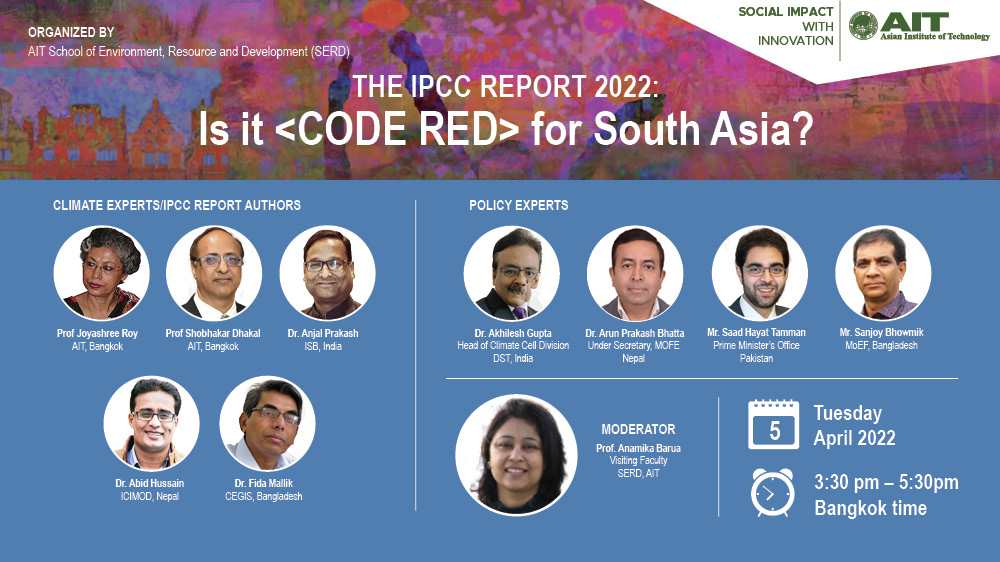By Mae Thiwari
Bangkok, April 5, 2022 – The Asian Institute of Technology (AIT) organized a virtual panel discussion that brought together climate and policy experts from four South Asian countries: Bangladesh, India, Nepal, and Pakistan, to discuss “The IPCC Report 2022: Is it Code Red for South Asia?”. Over 80 people participated in the webinar and the discussion shed light on climate vulnerabilities particular to each South Asian country and how the development pathway must be made more sustainable -- within this decade.
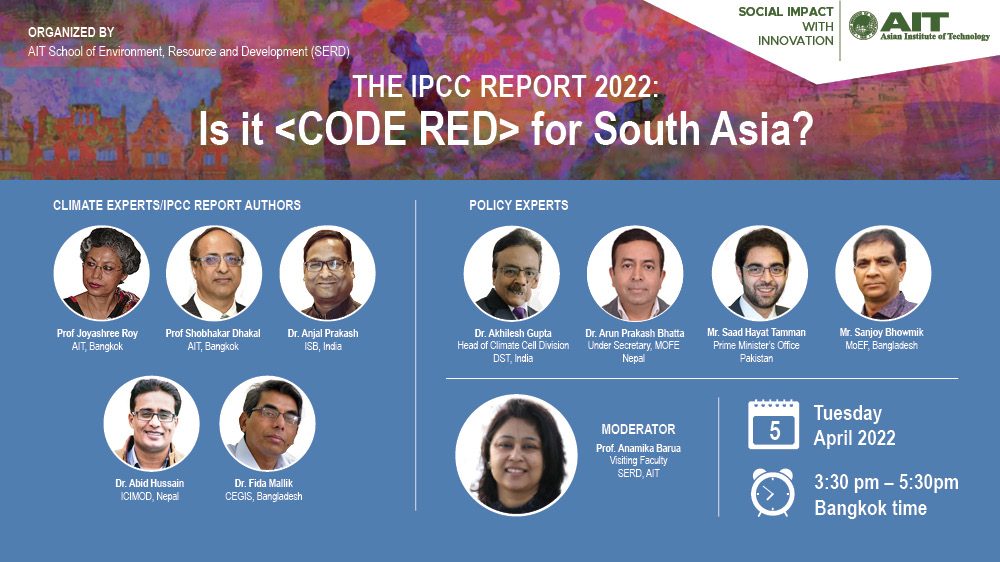
Every seven years, the three Working Groups (WG) of the Intergovernmental Panel on Climate Change (IPCC) – the United Nations body for assessing the science related to climate change, publish an Assessment Report consisting of four parts: WGI The Physical Science Basis; WGII Impacts, Adaptation and Vulnerability; WGIII Mitigation; and Synthesis Report. Released on April 4, 2022, the WGIII Report is an effort of 270 scientists from 65 countries with two of its Coordinating Lead Authors being professors from AIT: Prof Shobhakar Dhakal, Vice President for Academic Affairs, led Chapter 2 “Emission Trends and Drivers”, and Prof Joyashree Roy, Bangabandhu Chair Professor of Department of Energy, Environment and Climate Change, led Chapter 5 “Demand, Services and Social Aspects of Mitigation”.
Speaking first of the latest report at the global level, Prof Dhakal laid the findings of the 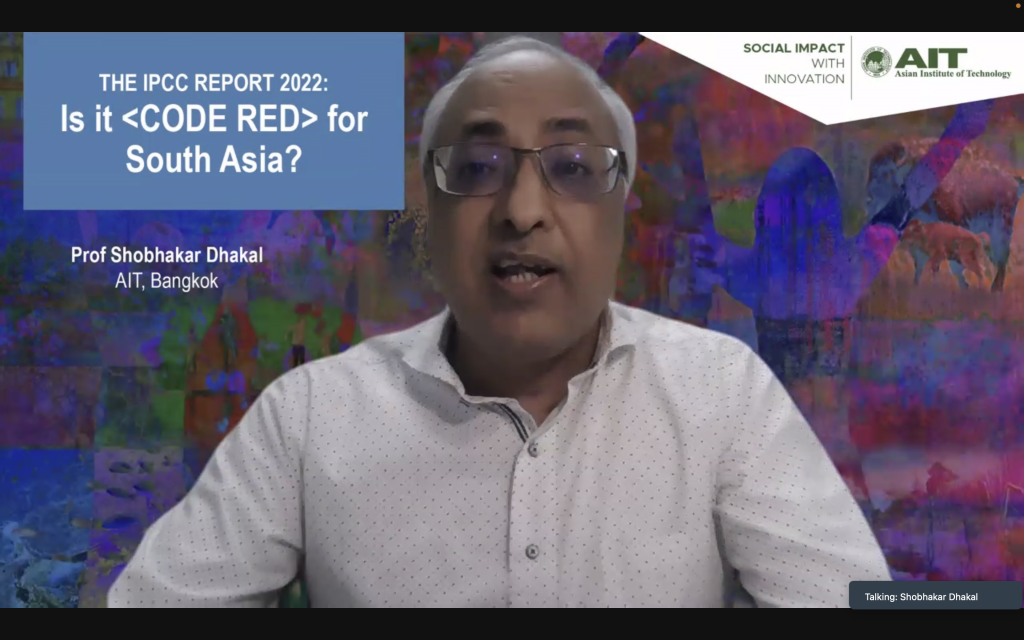 chapter that he led in plain science, “The report is clear that unless there are immediate and deep emission reductions across all the sectors, 1.5℃ is beyond our reach.” In other words, we are not on track to limit the global warming to 1.5℃ as promised in 2015 Paris Agreement, rather, it will go as high as double or 3.2℃. In this context, Prof Dhakal explained that it is possible to bring the warming back to 1.5℃, describing the temporary period of rising temperature exceeding 1.5℃ as “overshoot” period, where “a lot of things could happen to the natural ecosystems,” Prof Dhakal warned.
chapter that he led in plain science, “The report is clear that unless there are immediate and deep emission reductions across all the sectors, 1.5℃ is beyond our reach.” In other words, we are not on track to limit the global warming to 1.5℃ as promised in 2015 Paris Agreement, rather, it will go as high as double or 3.2℃. In this context, Prof Dhakal explained that it is possible to bring the warming back to 1.5℃, describing the temporary period of rising temperature exceeding 1.5℃ as “overshoot” period, where “a lot of things could happen to the natural ecosystems,” Prof Dhakal warned.
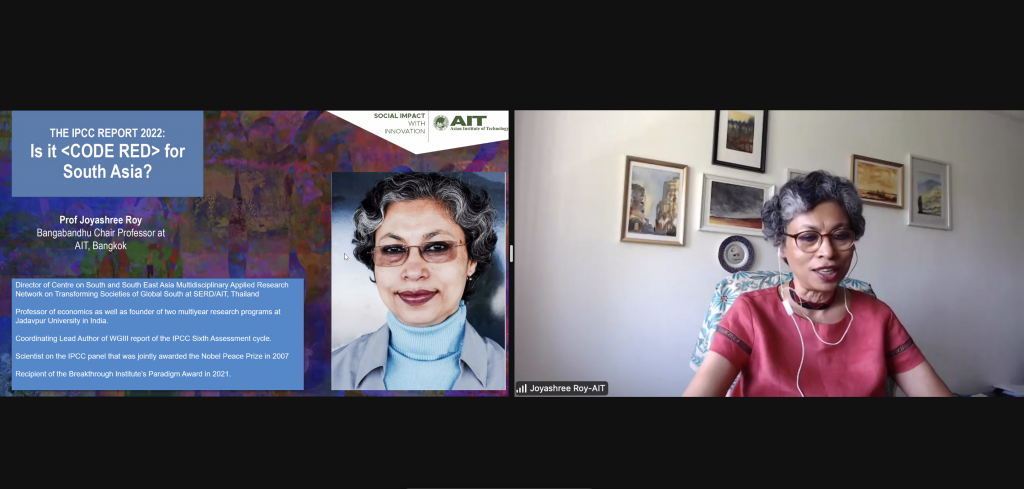
The report is not all doom and gloom, however. With a chapter, described by the IPCC media as “exciting”, on the social aspects of tackling climate change led by Prof Roy, there are many things that both governments and individuals can do to limit greenhouse gas emissions and bring us back on the 1.5℃ track. “One of the key messages is that each country can shift their development pathway toward sustainable development by adopting various options, in a variety of combinations that suit their national context,” Prof Roy highlighted.
Specific to South Asia context, climate experts from Bangladesh, India and Nepal weighed in on what the IPCC report specifically meant to their country. For Bangladesh, Dr Fida Mallik, Executive Director of Centre for Environmental and Geographic Information Services (CEGIS), shared how sea level rising is a huge threat for Bangladesh. For Nepal, Dr Abid Hussain, Senior Economist and Food Systems Specialist at the International Centre for Integrated Mountain Development (ICIMOD), highlighted that “climate change impacts are increasing in the mountain areas of South Asia,” not just Nepal, and changes are affecting across sectors. In India, Dr Anjal Prakash, Research Director and Adjunct Professor at Bharti Institute of Public Policy, The Indian School of Business (ISB), emphasized urban vulnerability as the major threat to India -- as there are more than tens of millions in each of the country’s major city.
To address climate risks faced by developing countries in South Asia, Dr Prakash suggested that climate financing should be put into “climate justice” framework to help the South Asia bloc negotiate with the developed countries at COP-27.
From identifying the threats, the event’s moderator, Prof Anamika Barua, Visiting 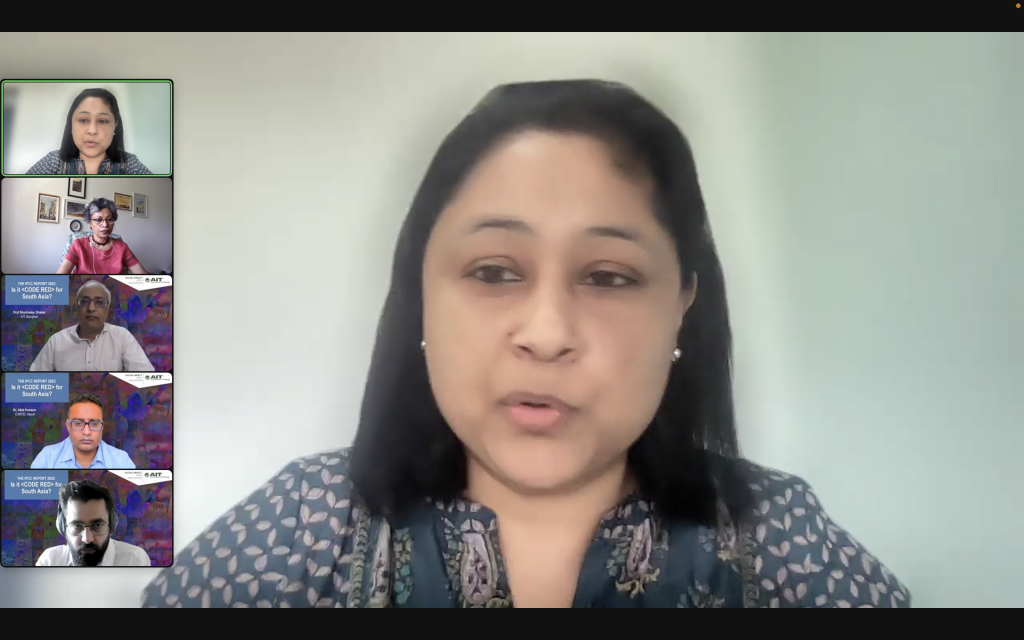 Faculty (under the government of India's secondment program with AIT) from the Indian Institute of Technology Guwahati (IITG), then asked the panelists to share their thoughts on climate financing. From the policy expert’s point of view, Dr Akhilesh Gupta, Head of Climate Cell Division, Department of Science and Technology, India’s Ministry of Science and Technology, shared that there is a gap between what was promised by the developed countries and what has been received by the developing countries so far. Given what the latest report shows, Dr Gupta stressed, “the global finance to the developed countries is now more important and urgent than it was.”
Faculty (under the government of India's secondment program with AIT) from the Indian Institute of Technology Guwahati (IITG), then asked the panelists to share their thoughts on climate financing. From the policy expert’s point of view, Dr Akhilesh Gupta, Head of Climate Cell Division, Department of Science and Technology, India’s Ministry of Science and Technology, shared that there is a gap between what was promised by the developed countries and what has been received by the developing countries so far. Given what the latest report shows, Dr Gupta stressed, “the global finance to the developed countries is now more important and urgent than it was.”
The discussion then moved towards plans and policies in place in each country for climate mitigation and adaptation. Highlighting Nepal’s effort in combating climate change, Dr Arun Prakash Bhatta, Under Secretary Ministry of Nepal’s Forests and Environment, mentioned that “Nepal aspires to be a leader not only in the adaptation but also in mitigating climate change, although the contribution of Nepal to global GHG emission is negligible”, While adaptation continues to be the priority for Bangladesh, Mr. Sanjoy Bhowmik Joint Secretary of Bangladesh’s Ministry of Environment, Forest and Climate Change, emphasised that “Bangladesh has submitted ambitious NDCs highlighting the mitigation efforts country is making along with adaptation”.
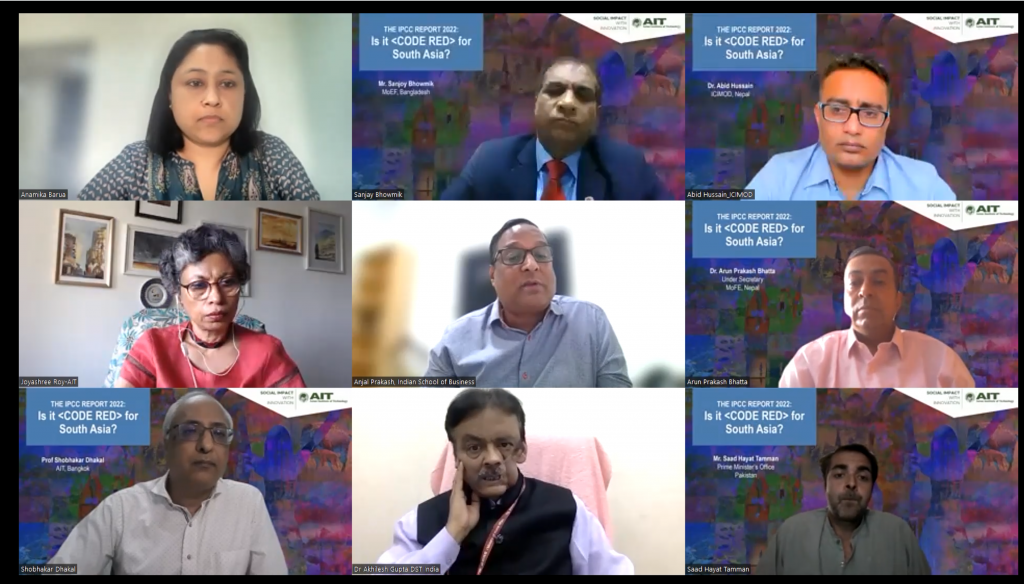
In response to Prof Anamika Barua’s, question on the key challenges faced by South Asian countries to implement climate science, Mr Saad Hayat Tamman, Member of Strategic Reforms & Implementation Unit at Pakistan’s Prime Minister’s Office stated that “it is important for the South Asian countries to have a vision and work together to translate this vision into an implementable plan. For this to happen, South Asia needs to invest not only in developing capacity and finance but also in political capital”
With an aim to create a science-policy dialogue in the context of South Asia, the panel discussion put together by AIT was seen as a success in bringing together policymakers and scientists to discuss and identify ways forward for the region. As although individuals can do their part to mitigate the impacts of climate change, Prof Roy reminded us that governments also have a part to play.
“Lifestyle change requires targeted policy support and investment in appropriate infrastructure,” Prof Roy concluded.
Watch the panel discussion "IPCC 2022 Report: Is it Code Red for South Asia?"
Read the Working Group III report here:
https://www.ipcc.ch/report/sixth-assessment-report-working-group-3/

